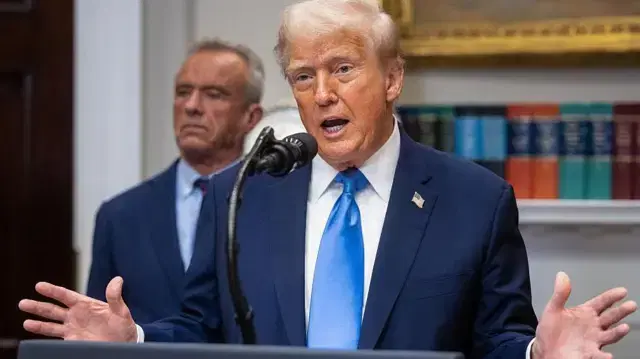WHO responds to Trump’s remarks on paracetamol, vaccines

The World Health Organisation (WHO) has responded to remarks made on Monday by President Donald Trump in Washington, suggesting that paracetamol use in pregnancy may cause autism.
Spokesperson Tarik Jasarevic stated that while some observational studies have raised questions, many others have found no such link, and the evidence overall remains inconsistent.
If there were a strong connection, he said, it would have been seen consistently across multiple studies.
Jasarevic, in a statement on Tuesday, said that medicines in pregnancy should always be used cautiously and under medical supervision, particularly in the first trimester.
Speaking in Geneva in response to journalists’ questions, the WHO spokesperson also rejected suggestions that routine childhood vaccines cause autism, noting that WHO’s immunisation schedules are based on decades of evidence and have saved more than 150 million lives over the past 50 years.
In a related development, Kate O’Brien, Director of the Department of Immunisation, Vaccines and Biologicals at WHO, assured that vaccines are powerful tools in public health.
“We are at a critical juncture. While the best estimates conclude that vaccines have saved more than 150 million lives over the past 50 years, the potential for their impact in future decades is increasingly threatened by another type of contagion: misinformation.
“Both misinformation and disinformation travel faster and further than truth. And their potential consequences include reversals of hard-won gains in vaccine coverage and disease control established over these decades.
“Vaccines have long been one of the most powerful tools in public health. They are arguably the most cost-effective public health intervention available, she said in a statement.
“They save more than five lives every minute, protect against severe disease and disability, reduce the burden on health systems, protect families from sinking into extreme poverty, and contribute to economic growth,’’ she added.
The director attributed the success to global vaccination efforts, noting that over 18 million people who would have been paralysed by polio can walk today.
She further said that over 90 million children who would have died from measles are alive, and more than a million deaths now and in the years to come from cervical cancer have already been averted.
“Tens of millions more who would have suffered severe disease, some with lifelong disabilities, from meningitis, pneumonia, whooping cough, congenital rubella, rotavirus diarrhea, diphtheria, tetanus, hepatitis B, and more, have never suffered those fates.
“And yet, we are risking the erosion of decades of progress—not because we lack safe and effective vaccines, nor because of a lack of innovation or commitment to vaccines, but because of misinformation.
“The consequences of vaccine misinformation are not hypothetical—they are real and tragic.
“There have been several recent cases of healthy children who died after contracting the highly contagious measles virus, or from complications of measles that can emerge years after recovery from a measles infection.”
According to her, childhood vaccination rates in some countries that had previously had very high rates are dropping to levels not seen in many years.
Kate O’Brien said that these national figures conceal the fact that coverage in some communities is substantially below even the national average and far below the 95 percent threshold needed to maintain herd immunity.
“This drop in coverage, particularly for the measles vaccine, is driving a significant rise in measles cases and deaths, including in wealthy countries like the U.S., Canada, the UK and other European countries.’’
The post WHO responds to Trump’s remarks on paracetamol, vaccines appeared first on Vanguard News.







